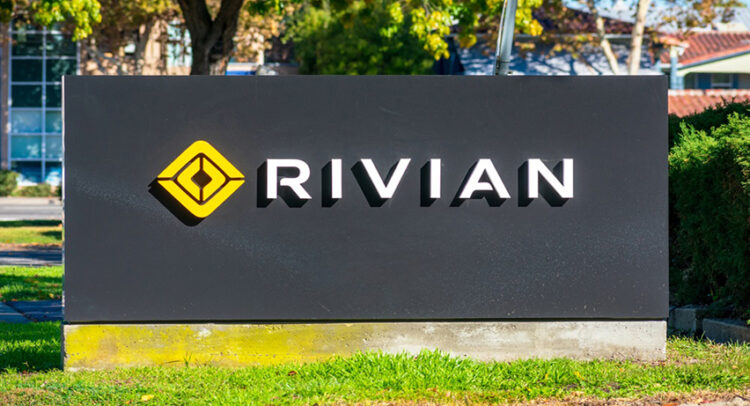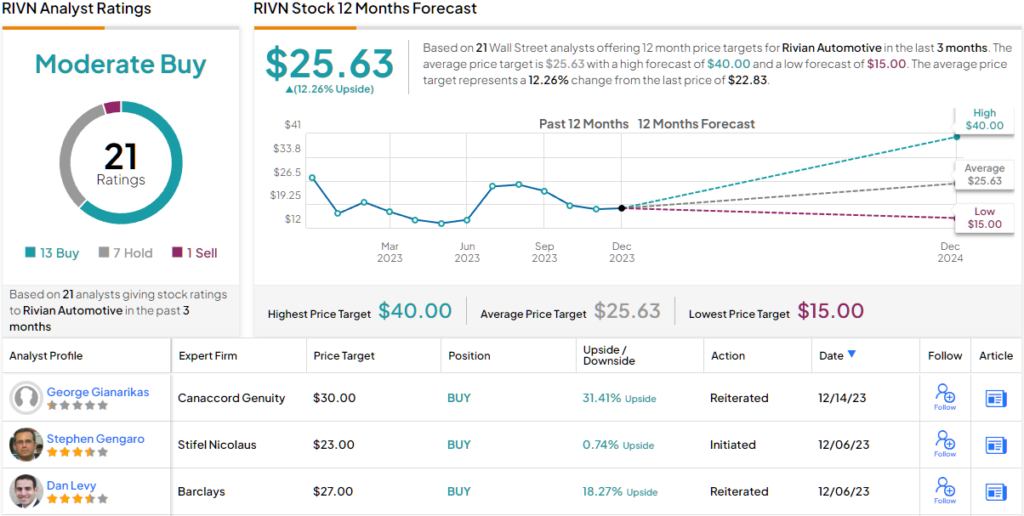Rivian Automotive (NASDAQ:RIVN) took investors for a rip-roaring ride last week, first falling 4% from last Friday’s close, only to turn on a dime when the Fed let slip that they might begin cutting interest rates next year – and soaring 25% over the last three trading days of the week.
Pick the best stocks and maximize your portfolio:
- Discover top-rated stocks from highly ranked analysts with Analyst Top Stocks!
- Easily identify outperforming stocks and invest smarter with Top Smart Score Stocks
Helping to keep the momentum going was a positive analyst note from Canaccord analyst George Gianarikas, who on Thursday decided to celebrate the fact that he just bought a new Rivian R1S electric SUV by writing a bit of an analyst’s love letter to the company from which he bought it.
“I’m excited about my recent R1S delivery (after a long wait). The handling, the software, the aesthetic (I chose the Ocean Coast interior) – all impeccable. We believe the company has done a masterful job of marrying outdoorsy and luxury, connecting rugged with lavish. I love it.”
More substantively, the analyst managed to find a bit of objectively good news upon which to hang his Buy rating and $30 price target on RIVN stock. Specifically, the fact that on Thursday, Rivian also inked a deal to sell AT&T some of its Rivian Commercial Van and R1 vehicles in a pilot program beginning in 2024.
Now, the press release on the AT&T-Rivian deal was actually pretty short on details about the arrangement. Aside from saying that it is a “pilot” project (i.e. small volume, and therefore probably small revenue for Rivian), the PR noted that AT&T’s primary motivation in buying Rivian vehicles is “cutting transport emissions.” Reading between the lines, it also seems that one reason AT&T chose to buy EVs from Rivian, and not one of the other dozens of car companies that make them, is that Rivian had already agreed to make AT&T its “exclusive provider of connectivity to all Rivian vehicles, in the U.S. and Canada.”
One imagines that this sweetener helped to seal the deal for Rivian.
However the deal got done, Gianarikas argues that it’s significant because it means that Rivian has now moved beyond its much ballyhooed relationship with Amazon (which is also buying Rivian electric vans) to sign up a second corporate giant as a fleet customer. The analyst notes that he was already anticipating deals like the AT&T one — but just not so soon. And the more such deals Rivian makes, the better it will be able to utilize its 65,000-vehicles-a-year electric van production capacity (by the end of next year) to grow revenues and maximize production efficiency.
Longer term, Gianarikas urges investors to keep an eye out for additional such corporate fleet deals in 2024, as well as the unveiling of a new budget-priced R2 family of electric vehicles for individual consumer-buyers. As the year progresses, the analyst forecasts that Rivian will grow total production capacity to 150,000 vehicles-per-year (65,000 vans and 85,000 electric trucks and SUVs), even as deliveries in 2024 reach only 55,000.
With capacity so much greater than demand, the analyst warns that gross profit margins will probably remain negative (10%) for the year, but hopes to see them turn positive by year-end 2024.
So, that’s Canaccord’s view. Let’s have a look at what the rest of the Street has in mind for Rivian shares. Based on 13 Buys, 7 Holds and 1 Sell, the analyst consensus rates RIVN a Moderate Buy. Going by the $25.63 average price target, shares are anticipated to be changing hands at a 12% discount over the next 12 months. (See RIVN stock forecast)
To find good ideas for stocks trading at attractive valuations, visit TipRanks’ Best Stocks to Buy, a tool that unites all of TipRanks’ equity insights.
Disclaimer: The opinions expressed in this article are solely those of the featured analyst. The content is intended to be used for informational purposes only. It is very important to do your own analysis before making any investment.




















